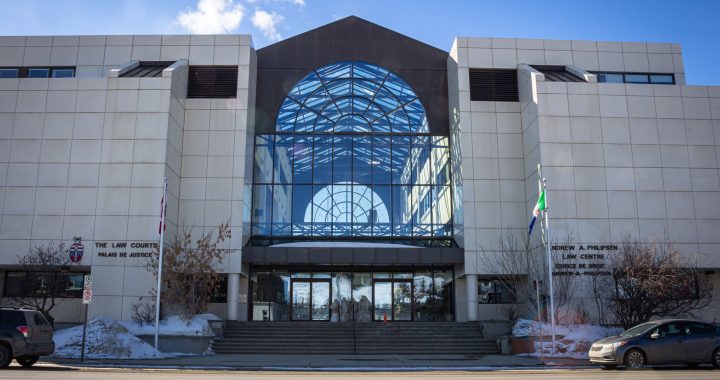A federal government contract to provide pharmaceuticals and medical supplies to remote northern First Nations was awarded to a company owned by a man up on charges for being a brutal pimp – a contract that carried on even while he served four years in prison, APTN Investigates has learned.
In the mid 1990s, Gary Wayne Gabriel Patterson was a lawyer and businessman by day and pimp by night.
“He was a brutal pimp,” recalls Toronto Sun court reporter Sam Pazzano, who covered Patterson’s trial. “He said to all his victims ‘I’m your celestial overlord I own your body, mind and soul. That’s not the kind of language you get from your garden-variety high school drop-out pimp. But he was just as brutal as them and would threaten his victims like other pimps do and say he’ll kill them, torture them, mutilate them and even hurt their families if they dare to leave him.”
Back in 1999, awaiting trial on pimping charges, Paterson was co-owner of Grand Medicine Health Services.
That business was awarded a contract to provide mail-in medications to patients in remote northern Manitoba communities. A contract that happened under the watch of Paul Cochrane – a disgraced Health Canada bureaucrat, acccording to the Globe and Mail who was eventually jailed for taking kickbacks from Sagkeeng First Nation’s Virginia Fontaine Treatment Centre.
Shortly after the contract was won, Patterson’s business partner, Gail Halko left the company, handing it over to Patterson. When asked by APTN Investigates, she wouldn’t say if her departure was related to the charges Patterson faced.
In May 2000 Patterson was convicted of charges, according to The Globe including procuring, living off the avails of prostitution, kidnapping, and uttering death threats.
He began his seven-year sentence in June 2000.
But on the eve of that, he gave Grand Medicine, with the federal government contract, to his mother, Catherine Patricia Patterson. Testimony at his trial heard his mother was herself a former prostitute, turned school teacher. She was now running the company responsible for getting medications to patients in remote vulnerable communities.
In 2003, Grand Medicine is sold. Bought by a newly-formed company called Northwest Healthcare. Halko returns as Grand Medicine’s chief operating officer and a shareholder. And shareholders in Northwest Healthcare? Patterson’s twin daughters. They would have been eight years old.
When Patterson is released from prison after serving four of his seven-year sentence, he soon emerges on Northwest Healthcare’s corporate documents as president.
That company owns 51 per cent of Grand Medicine while Halko owns the other 49.
Yet Halko told APTN via email Patterson “has not been a partner, owner or shareholder in our company since 1999. He has in no way been involved in the operation or governance of Grand Medicine since that time.”
And she says Grand Medicine didn’t have the pharmacy contract for periods in 2000 2001 and 2003 although the government’s records show the contract went uninterrupted from 1999 to 2015. And in 2011, Ottawa even expanded the contract to include other non-insured health benefits. Taxpayers were paying Grand Medicine $9-$10 million a year in the final years of the contract.

Regina-Lewan MP Erin Weir is the NDP’s public procurement critic.
“It’s just very surprising and very strange that the government continued to expand the contract,” he said. “You maybe couldn’t take the contract away from the mother because the son was in prison but you have to hope that federal officials would do some due diligence before awarding or enlarging these types of agreements.”
The contract was granted under the Aboriginal Set Aside Program, which gives favor to Aboriginal-owned companies. But
But APTN obtained parole board documents that reveal Patterson was chairman of the black inmates committee in prison and the board questioned the authenticity of an Indigenous “spiritual journey” he embarked upon.
Patterson declined to be interviewed for this story but through his lawyer says he is as “AfroMetis” of Mi’kmaw and Mohawk decent.
She also said he’s completed his time and is now a law-abiding citizen.
“I wouldn’t suggest a blanket ban on ex-convicts being involved in government contracts because of course, we do have a correctional system that is based on rehabilitation,” said Weir. “After someone has done their time we need to be careful, but if they’ve rehabilitated and reintegrated into society, that’s something we should want to encourage.”
Public Services and Procurement Canada says since an Integrity Regime was implemented in 2015, there’s closer scrutiny of who is involved in the businesses seeking government contracts.
That same year, Grand Medicine lost the contract to newcomer Muskehki Pharmacy.
Weir said the system still isn’t fail-proof.
“I think government procurement has had a lot of problems. It’s a work in progress and there’s room for improvement,” said the critic
And there are allegations of new problems with this particular pharmaceutical contract.
In 2016, a complaint was filed with the College of Pharmacists of Manitoba alleging as many as 24 people died as a result of not getting their prescriptions during the transition from Grand Medicine to Muskehki.
The complaint was filed by Daren Jorgenson, owner of Four Rivers Medical, after a closed door meeting in June 2016.
“I was with a prominent chief … and a topic that came up was the level of pharmacy services and this high level bureaucrat told me and the chief they have documented 24 deaths as a result of people not being able to get their medications,” Jorgenson said.
So he complained and asked the College to commence an investigation.
He admits having a dog in the fight, though. At the time, he was considering putting in a bid for the next contract. Deadline for that was June 2 and he decided not to.
The College of Pharmacists in an email said their investigation has wrapped up and “at this stage the findings remain private as a decision has not yet been made” as to whether or not there are grounds for discipline or the allegations were unfounded.
Through Freedom of Information requests, APTN obtained 54-pages related to critical incidents in the communities covered by the northern pharmacy contract, and in the timeframe, Jorgenson asserts there were deaths. But because of patient confidentiality, the report was too heavily redacted to know if there were deaths.
But the Assembly of Manitoba Chiefs Patient Advocacy Unit says they don’t believe there’s been even one.
“In my nine years here I’ve never heard one case of an individual who has died as a result of that,” said Kevin Fontaine, who heads the unit.
No such deaths made the radar of the Manitoba coroner’s office either.
But Fontaine did say there is a problem with people not getting medications. But it has nothing to do with the pharmacies.
“One of the reasons is non-coverage from non-insured health benefits so that becomes and issue so we have to fight on their behalf to get these individuals these medications,” Fontaine said.
He also described the services provided by grand Medicine for 17 years and Muskehki for two as being satisfactory, from everything he’s heard on the ground.
The problem, he says, is said Ottawa de-lists medications – including ones for diabetes and cancer – and his unit has to fight for patients to be covered for those.
Jorgenson stands by his complaint and has even filed a second complaint, against the College of Pharmacists themselves for not dealing with his first.
“My end game is to hold people accountable,” he said.













Great Work!!!Keep it up.